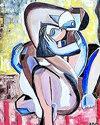The Failure of Language Amidst the Joy of Grace
IF 0.3
4区 社会学
0 HUMANITIES, MULTIDISCIPLINARY
ANGELAKI-JOURNAL OF THE THEORETICAL HUMANITIES
Pub Date : 2023-03-04
DOI:10.1080/0969725X.2023.2192070
引用次数: 0
Abstract
Abstract For Clarice Lispector, language is a sacrament on dazzling display in her work, where the celebration of writing and the emergence of a creative consciousness through the act of writing about writing access an immanent experience of grace beyond any historical religious sensibility. In this, she simultaneously accesses the “great potency of potentiality” that is an experience of freedom undoing anything bound up by language. She embraces the failure of language as the “glory of falling,” the useless experience of grace, and of experiencing the gift of having a body beyond whatever words we can place upon it. In the struggle to behold the “it” underneath language, she strives for an impersonal love – a joy – that respects the inviolability of nature, the “Force of what Exists and that is sometimes called God.” If “the absence of the God is an act of religion,” as she claims, the inviolability of nature is that which preserves an experience of immanent grace in our world. Rather than describe the limitless potential of the self, one’s immersion in the joyful failure of language points toward the self in unique and profound ways without offering definitions, instead allowing internal contradictions to condition one’s selfhood. In Lispector’s fiction we thus confront the pure paradox of the self: an internal, singular individual who yet maintains within themselves (hence, its immanence) a plurivocal affirmation of existence itself and a redefining of God.在恩典的喜悦中语言的失败
摘要对Clarice Lispector来说,语言是一种圣礼,在她的作品中得到了耀眼的展示,在那里,对写作的庆祝和通过写作行为产生的创造性意识,获得了超越任何历史宗教情感的内在优雅体验。在这一过程中,她同时获得了“巨大的潜能”,这是一种自由的体验,可以消除任何被语言束缚的东西。她将语言的失败视为“堕落的荣耀”,是对优雅的无用体验,也是对拥有超越一切语言的身体的天赋的体验,“存在的力量,有时被称为上帝。”如果“上帝的缺席是宗教行为”,正如她所声称的,那么自然的不可侵犯性就是在我们的世界中保留了一种内在恩典的体验。一个人沉浸在语言的快乐失败中,而不是描述自我的无限潜力,而是以独特而深刻的方式指向自我,而不是提供定义,而是让内部矛盾来制约自己。因此,在利斯佩克特的小说中,我们面临着纯粹的自我悖论:一个内在的、独特的个体,他在自己内部(因此,它的内在性)保持着对存在本身的多元肯定和对上帝的重新定义。
本文章由计算机程序翻译,如有差异,请以英文原文为准。
求助全文
约1分钟内获得全文
求助全文
来源期刊

ANGELAKI-JOURNAL OF THE THEORETICAL HUMANITIES
HUMANITIES, MULTIDISCIPLINARY-
CiteScore
0.60
自引率
33.30%
发文量
57
期刊介绍:
Angelaki: journal of the theoretical humanities was established in September 1993 to provide an international forum for vanguard work in the theoretical humanities. In itself a contentious category, "theoretical humanities" represents the productive nexus of work in the disciplinary fields of literary criticism and theory, philosophy, and cultural studies. The journal is dedicated to the refreshing of intellectual coordinates, and to the challenging and vivifying process of re-thinking. Angelaki: journal of the theoretical humanities encourages a critical engagement with theory in terms of disciplinary development and intellectual and political usefulness, the inquiry into and articulation of culture.
 求助内容:
求助内容: 应助结果提醒方式:
应助结果提醒方式:


